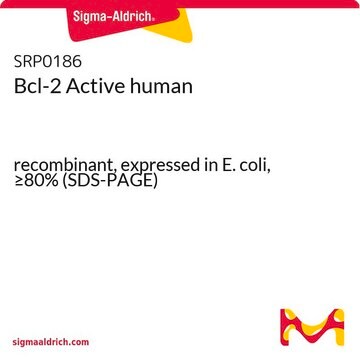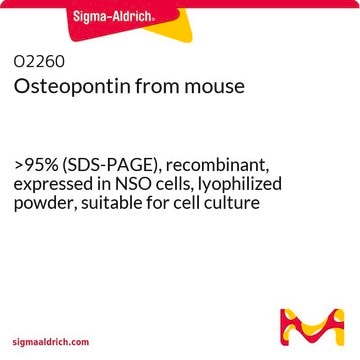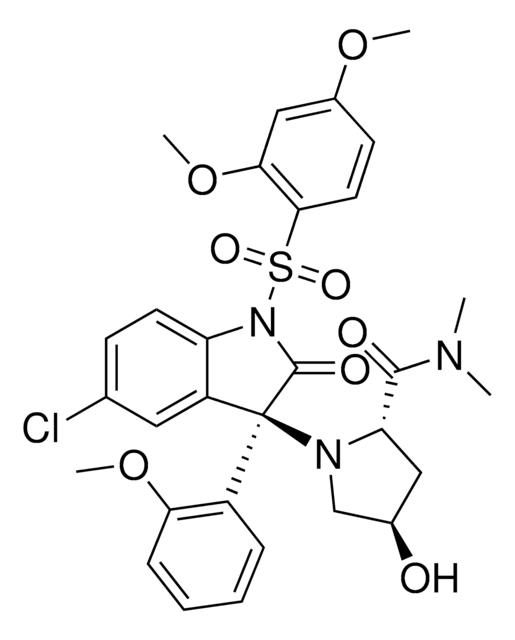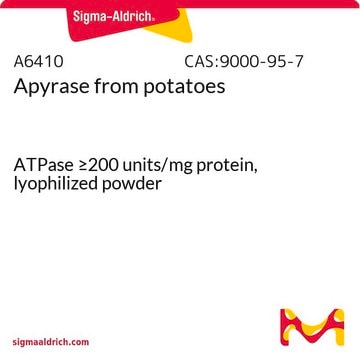SRP5166
BAX, GST tagged human
recombinant, expressed in E. coli, ≥70% (SDS-PAGE), buffered aqueous glycerol solution
Sign Into View Organizational & Contract Pricing
All Photos(1)
About This Item
Recommended Products
General description
BCL2 associated X, apoptosis regulator (BAX) is a proapoptotic protein of the B-cell lymphoma 2 (BCL2) protein family. The gene encoding it is localized on human chromosome 19q13.33.
Biochem/physiol Actions
BCL2 associated X, apoptosis regulator (BAX) forms a heterodimer with B-cell lymphoma 2 (BCL2) and functions as an apoptotic activator. BAX interacts with and increases the opening of the mitochondrial voltage-dependent anion channel (VDAC), which leads to the loss in the mitochondrial membrane potential and the release of cytochrome c. The expression of BAX gene is regulated by the tumor suppressor p53 and BAX has been shown to be involved in p53-mediated apoptosis. Multiple alternatively spliced transcript variants, which encode different isoforms, have been reported for this gene.
Physical form
Supplied in 50mM Tris-HCl, pH 7.5, 150mM NaCl, 10mM glutathione, 0.1mM EDTA, 0.25mM DTT, 0.1mM PMSF, 25% glycerol.
Preparation Note
after opening, aliquot into smaller quantities and store at -70 °C. Avoid repeating handling and multiple freeze/thaw cycles
Storage Class Code
10 - Combustible liquids
WGK
WGK 1
Flash Point(F)
Not applicable
Flash Point(C)
Not applicable
Certificates of Analysis (COA)
Search for Certificates of Analysis (COA) by entering the products Lot/Batch Number. Lot and Batch Numbers can be found on a product’s label following the words ‘Lot’ or ‘Batch’.
Already Own This Product?
Find documentation for the products that you have recently purchased in the Document Library.
Wnt signal transduction pathway and apoptosis: a review
Nives P
Cancer Cell International (2010)
Bcl-2 family proteins and cancer
KW Yip
Oncogene (2008)
S Shimizu et al.
Nature, 399(6735), 483-487 (1999-06-12)
During transduction of an apoptotic (death) signal into the cell, there is an alteration in the permeability of the membranes of the cell's mitochondria, which causes the translocation of the apoptogenic protein cytochrome c into the cytoplasm, which in turn
Role of Bcl-2 family proteins in apoptosis:
apoptosomes or mitochondria?
apoptosomes or mitochondria?
Yoshihide Tsujimoto
Genes Cells (2001)
The role of Bcl-2 and its pro-survival relatives in tumourigenesis and cancer therapy
P. N. Kelly
Cell Death and Differentiation (2011)
Our team of scientists has experience in all areas of research including Life Science, Material Science, Chemical Synthesis, Chromatography, Analytical and many others.
Contact Technical Service








